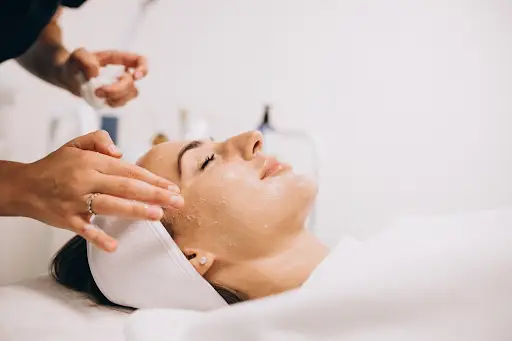7 Post-Facial Restrictions You Need to Be Aware Of
Author: Nulook ExpertiseReview by: -After a facial treatment, it's important to maintain healthy and well-cared-for skin. There are several post-facial restrictions you need to follow to avoid irritation or other skin problems. Post-facial skincare requires extra attention since the skin is usually more sensitive and vulnerable to external factors. Let's dive into some post-facial restrictions you should avoid below.
Read Also: 9 Effective Ways to Treat Itchy Acne
Post-Facial Restrictions
After a facial, your skin is usually more sensitive due to the cleansing, exfoliation, and other treatments performed during the procedure. To maximize the benefits of the facial and avoid skin issues, it’s important to follow certain post-facial restrictions. Here are some things you should avoid after a facial:
1. Avoid Direct Sun Exposure
After a facial, your skin is more vulnerable to UV rays due to the exfoliation performed during the treatment. Direct sunlight can cause sunburn or dark spots.
It’s best to avoid direct sun exposure for at least 24-48 hours after a facial. If you must go outside, make sure to use sunscreen with a high SPF to protect your skin from further damage.
2. Avoid Using Makeup
Post-facial skin needs to breathe and recover without being blocked by makeup products. Applying makeup after a facial can clog newly cleaned pores, leading to irritation or breakouts.
It's recommended to refrain from wearing makeup for at least one day to allow the skin to absorb the benefits of the treatment and recover properly.
3. Don't Wash Your Face with Hot Water
Washing your face with hot water after a facial can cause irritation and worsen skin sensitivity. Hot water can open pores that are still in the process of closing post-facial, causing the skin to lose natural moisture and become susceptible to bacteria. Instead, use lukewarm or cool water when cleansing your face to soothe the skin and maintain moisture.
4. Avoid Activities That Cause Excessive Sweating
Sweating after a facial can cause bacteria and dirt from sweat to clog the newly cleansed pores, increasing the risk of breakouts or skin irritation. Therefore, you should avoid strenuous physical activities, saunas, or any activities that cause excessive sweating for at least 24 hours after a facial.
5. Avoid Touching or Picking Your Face
Post-facial skin is more sensitive, so picking or touching your face can cause irritation, inflammation, or even infection. Additionally, dirty hands can transfer bacteria to your face, increasing the risk of skin issues. Avoid touching your face frequently and let your skin heal naturally after the treatment.
Read Also: 9 Effective Ways to Treat Itchy Acne
6. Avoid Skincare Products with Strong Active Ingredients
After a facial, your skin is more sensitive than usual, so it’s best to avoid using products with active ingredients like retinol, AHA, BHA, or high-concentration vitamin C. These ingredients can cause irritation or redness as the skin hasn't fully recovered from the treatment.
Instead, opt for moisturizing and soothing products like hydrating serums or creams containing aloe vera and hyaluronic acid to aid in skin regeneration.
7. Don't Do Additional Exfoliation
The exfoliation process is already performed during the facial to remove dead skin cells and clean pores. If you perform additional exfoliation after the facial, it can damage the newly treated skin and cause irritation or inflammation. It’s best to avoid scrubs or other exfoliating products for a few days and let your skin recover before resuming your exfoliation routine.
Post-Facial Care You Should Follow
After a facial, your skin needs extra care to prolong the treatment results and keep it healthy. Facials often make the skin more sensitive due to deep cleansing, exfoliation, and other procedures. Here are some post-facial care steps you should follow:
1. Use a Soothing Moisturizer
After a facial, your skin may lose moisture due to the intense exfoliation and cleansing. Therefore, it’s crucial to use a moisturizer with soothing properties, such as those containing aloe vera or hyaluronic acid. This will help lock in moisture, repair the skin barrier, and provide a calming effect on skin that may experience slight redness or irritation.
2. Apply Sunscreen Regularly
Post-facial skin is more prone to UV damage due to the exfoliation process. Therefore, you should consistently apply sunscreen with at least SPF 30 whenever you go outside. Sun exposure without protection can damage freshly treated skin and cause dark spots, premature aging, and slow the healing process.
3. Drink Plenty of Water to Hydrate from Within
External care alone is not enough to keep your skin healthy after a facial. You also need to hydrate your skin from within by drinking plenty of water. Staying hydrated will help speed up the skin’s recovery process. Optimal hydration from within will make your skin look fresher and glowing after a facial. Besides water, consuming water-rich foods like fresh fruits can provide additional benefits for your skin.
Read Also: 10 Best Face Lifting Treatments for Facial Rejuvenation
Understanding and following post-facial restrictions is crucial for maintaining skin health and maximizing the benefits of the treatment. By avoiding direct sunlight, makeup, and strong active ingredient products, you can ensure that your skin recovers well without the risk of irritation or other skin problems.
If you want to get the best facial treatment and experience its benefits to the fullest, visit Nulook for a quality facial treatment experience in Bali. Nulook’s professional treatments will help maintain your skin’s beauty with the right techniques and quality products.
So, what are you waiting for? Visit Nulook and make your appointment now!
References:
- https://www.ncbi.nlm.nih.gov/pmc/articles/PMC3105446/
- https://geneo-us.com/facial-treatments/what-to-expect-before-and-after-facial-treatments/


